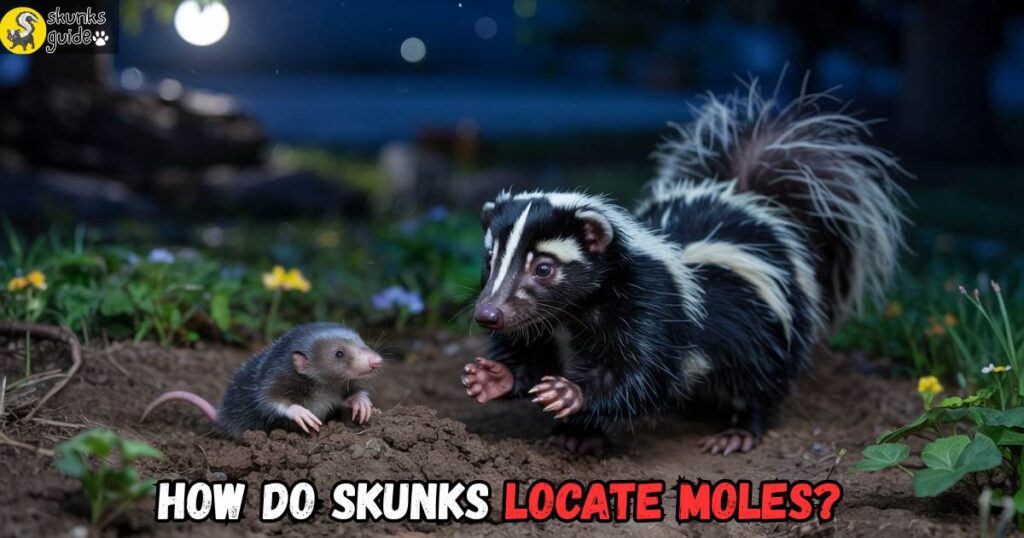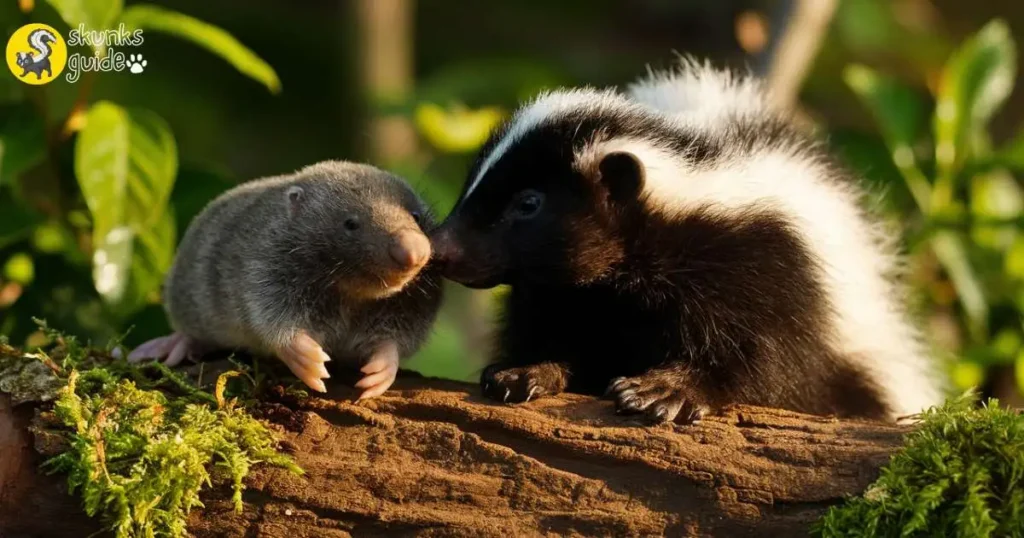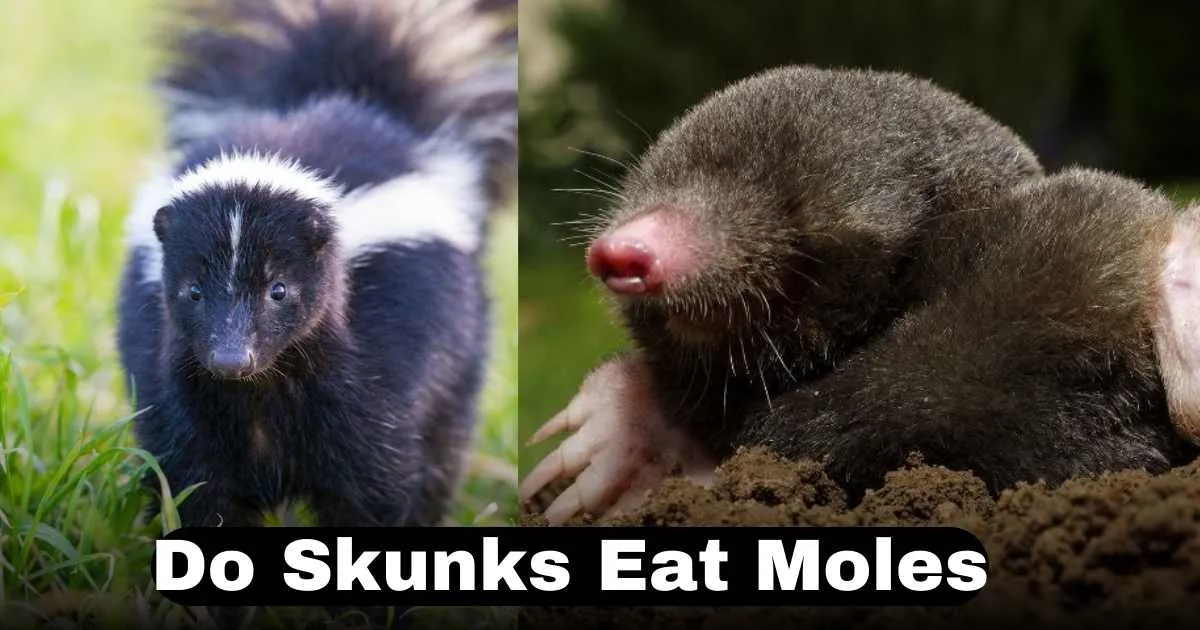Can Skunks Eat Moles? Their Diet Explained
Last updated on June 30th, 2025 at 10:43 am
As a skunk pet owner and wildlife enthusiast, I’ve always been fascinated by the diverse dietary habits of skunks. These nocturnal creatures are opportunistic feeders, eating a wide variety of foods that range from insects to small mammals. But do skunks eat moles? The short answer is yes—skunks can and do eat moles, but they don’t actively hunt them as a primary food source. Instead, skunks may consume moles when they encounter them while foraging for other foods like grubs or insects underground.
In this detailed guide, we’ll explore whether skunks eat moles, how they locate them, the ecological impact of this behavior, and practical tips to manage skunk activity in your yard.
Do Skunks Eat Moles in Yards?
So, do skunks eat moles in yards? Yes, skunks may eat moles in yards, but it’s uncommon. Addressing queries like “will skunks eat moles,” the answer hinges on opportunity. Moles live primarily underground, making them harder for skunks to catch compared to grubs or worms. Skunks often dig in yards for mole prey like grubs, which can lead to confusion about whether they’re targeting moles themselves. Can skunks eat moles? While skunks will eat a mole if they find one (e.g., a sick or exposed mole on the surface), moles are not a primary food source due to their elusive nature. Compared to dedicated mole predators like owls or foxes, skunks are less likely to pursue moles actively. The National Wildlife Federation explains that skunks’ digging behavior is more about accessing insect larvae than hunting moles, clarifying this common misconception.
Benefits and Risks of Skunks Eating Moles
Skunks eating moles can have both positive and negative impacts on your yard:
- Benefits:
- Natural Pest Control: Skunks eating moles or their food source (grubs) can reduce mole activity, which helps prevent lawn damage from tunnels.
- Ecosystem Balance: Skunks contribute to controlling small mammal and insect populations, supporting a healthy backyard ecosystem.
- Risks:
- Yard Damage: Skunks digging for moles or grubs can create unsightly holes and disrupt grass or gardens.
- Skunk Spray: If disturbed while foraging, skunks may spray pets or humans, leaving a lingering odor (a concern you explored with vinegar and tomato juice remedies).
- Disease Risk: Though rare, skunks can carry diseases like rabies, as noted by the CDC, posing a minor risk to pets or humans.
James Don from Skunks Guide suggests that while skunks can help control pests, their digging habits often outweigh the benefits for homeowners, requiring careful management.
How Do Skunks Locate Moles?

Skunks have an excellent sense of smell, which allows them to detect food sources underground. Their sharp claws are adept at digging, enabling them to uncover grubs, worms, and, occasionally, moles.
Signs That Skunks Are Digging for Moles
- Small, cone-shaped holes: These are signs of skunks foraging for grubs or insects.
- Disturbed soil near mole tunnels: Skunks might dig into molehills or burrows.
- Patchy grass or yard damage: Indirect effects of skunks searching for prey underground.
Are Moles a Nutritious Meal for Skunks?
Moles provide a high-protein, high-fat meal for skunks, which can be especially beneficial during colder months when food sources are scarce. The nutritional benefits include:
- Protein: Essential for muscle growth and repair.
- Fat: Provides energy and helps skunks maintain their body temperature in winter.
- Minerals: Found in animal tissue, supporting overall health.
While moles are not a staple in the skunk’s diet, they offer significant nutritional value when consumed.

The Ecological Role of Skunks in Controlling Moles
Skunks are natural pest controllers, helping to manage populations of insects, rodents, and, occasionally, moles. Here’s how skunks contribute to ecological balance:
- Control Pest Populations: By eating insects and moles, skunks prevent these creatures from overpopulating and damaging lawns or gardens.
- Soil Aeration: Skunks’ digging activities aerate the soil, improving its health and nutrient distribution.
- Food Web Balance: As both predators and prey, skunks play a crucial role in maintaining biodiversity.
While skunks won’t eradicate moles from your yard, their presence can help reduce mole activity over time.
How to Manage Skunks and Moles in Your Yard

To balance the presence of skunks and moles in your yard, follow these practical steps:
Managing Skunks
- Remove Attractants: Secure trash cans, remove pet food, and clear fallen fruit to avoid drawing skunks.
- Use Deterrents: Install motion-activated lights or sprinklers to scare skunks away, especially at night when they’re active.
- Seal Entry Points: Block access under decks, sheds, or porches where skunks may nest.
Managing Moles
- Humane Traps: Use live traps to relocate moles, following local wildlife regulations.
- Natural Repellents: Apply castor oil-based repellents to deter moles without harming them.
- Lawn Maintenance: Reduce grubs (a mole’s primary food) with organic treatments like beneficial nematodes.
Coexistence Tips
Encourage skunks to focus on grubs by maintaining a healthy lawn, which indirectly reduces mole activity. If skunks or moles become problematic, contact a wildlife professional for safe removal. The AVMA recommends consulting a veterinarian if pets encounter skunks, especially if sprayed (tying to your interest in skunk odor remedies like vinegar or hydrogen peroxide).
Frequently Asked Questions
No, moles are not a regular part of a skunk’s diet. Skunks may eat moles occasionally if they encounter them while digging for insects or other food.
Skunks can help reduce mole activity indirectly by eating moles they encounter, but they are not a reliable method for mole control.
Yes, skunks may leave small holes in the yard while digging for insects or moles. However, this damage is typically less severe than that caused by moles themselves.
Conclusion
Yes, skunks can eat moles, but it’s not a common occurrence. These opportunistic feeders are more likely to consume moles they encounter while foraging for grubs or insects underground. While moles are not a staple in the skunk’s diet, they provide a nutritious meal when available.
Understanding the dietary habits of skunks and their ecological role helps us coexist with these fascinating creatures. Whether they’re controlling pests or aerating soil, skunks play an important part in maintaining healthy ecosystems. By managing skunk and mole activity responsibly, you can protect your yard while supporting local wildlife.

